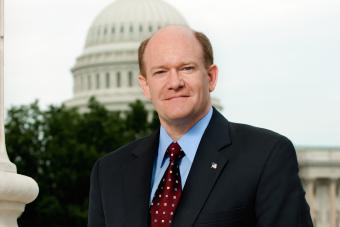[Sen. Chris Coons] RFK's message to South Africa and the U.S.
Blog
Last week, I led a group of my colleagues on a trip to South Africa. Along with Rep. John Lewis (D., Ga.), a hero of America's civil rights movement, and Kerry Kennedy, president of RFK Human Rights and daughter of the late Sen. Robert F. Kennedy, we traveled to South Africa to commemorate the 50th anniversary of the senator's historic "Ripples of Hope" speech at the University of Cape Town.
On June 6, 1966, speaking to a nation struggling through the cruel injustices of apartheid, Kennedy began his speech by describing "a land in which the native inhabitants were at first subdued, but relations with whom remain a problem to this day; a land which defined itself on a hostile frontier; . . . a land which was once the importer of slaves, and now must struggle to wipe out the last traces of that former bondage."
Kennedy then paused before concluding, "I refer, of course, to the United States of America."
As Kennedy made clear, America and South Africa share more than we may realize. While there are fundamental differences between our two countries, we have similar stories to tell and many lessons we can learn from each other.
Our two constitutional democracies have been supported by courageous and principled leaders, but we have both learned that nations do not endure because of individuals - they endure because of institutions.
Today, South Africa's postapartheid nonracial democracy is struggling to deliver on the promise of its ambitious founding principles and to transform its economy to generate opportunity for all its citizens. Meanwhile, the United States is mired in dysfunctional politics, and significant portions of our population justifiably believe we have failed to make even modest progress on the problems we face.
Our nations share deeply embedded legacies of racial discrimination and division from which we have not yet healed - in fact, civil rights activist James Meredith was shot by a white gunman in Mississippi during Kennedy's trip to South Africa.
We share complex histories of struggles balancing the roles of violence and nonviolence in seeking justice and equality under the law.
We share flawed criminal justice systems that disproportionately punish our citizens of color, and we share imperfect education systems that don't do enough to educate and empower them.
We share remarkable constitutions and inspiring foundational documents - South Africa's Freedom Charter and our own Declaration of Independence - whose soaring principles say powerful things, but whose lived experiences have fallen short.
We each struggle to find the most appropriate way to welcome and incorporate millions of undocumented immigrants and to prevent tensions associated with xenophobia.
Yet despite our common shortcomings, we also share a commitment to democracy framed by strong original documents, respect for the rule of law, and independent judiciaries - institutions created and sustained by the likes of Nelson Mandela and George Washington, who as founding presidents stepped down from their offices willingly out of respect for their constitutions.
We share centuries-long traditions of faith and religion, which were at times twisted into justifications for discrimination and prejudice, but which have also served as the guiding light for the nonviolent efforts to achieve justice. It is these very faith traditions that have inspired some of our most storied leaders, from Congressman Lewis to Archbishop Desmond Tutu.
As we look back 50 years, we see that progress is possible, but Kennedy's observation in 1966 that "humanity sometimes progresses very slowly indeed" remains true.
Today, South Africa, with its independent judiciary, strong public protector office, and vibrant media, is showing how important civic institutions are to sustaining democracy and preserving the progress of humanity.
In the years to come, the United States and South Africa must look to each other as we continue to heal the damage of racial injustice, reverse growing economic inequality, and protect our evolving experiments in democracy.
While both countries have been blessed with the inspirational leadership of exceptional figures, nations over time cannot rely on the constant presence of such gifted leaders. Nations must endure because of strong institutions. Institutions, in turn, endure because we as individuals try every day to make them a little better.
Two months after he returned to the United States, Kennedy reflected on his Cape Town speech. "I acknowledged the United States, like other countries, still had far to go to keep the promises of our Constitution," he said. "What was important . . . was that we were trying."
Twenty-five years later, Nelson Mandela told an American audience, "I am not a saint, unless you think of a saint as a sinner who keeps on trying."
The people of the United States must keep on trying. The people of South Africa must keep on trying.
We must all keep on trying because, as President Obama said, "action and ideas are not enough. No matter how right, they must be chiseled into law and institutions."
We have a lot of trying left to do, and from each other, we have much to learn - and much to teach the rest of the world. Let us face these challenges together.
-U.S. Senator Chris Coons
The above Op-ed was featured on Philly.com on June 7, 2016.